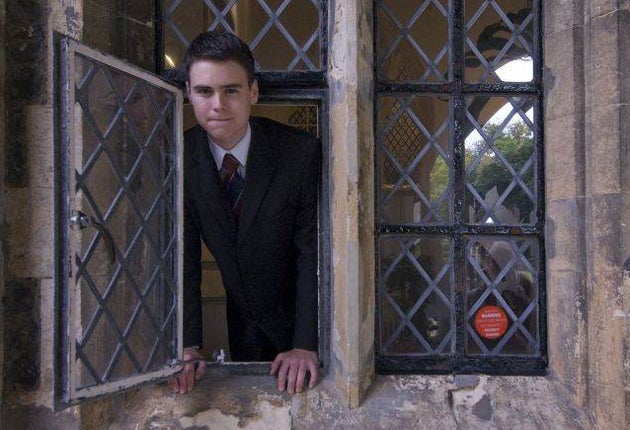Independent schools to open their sixth forms to state pupils

Your support helps us to tell the story
From reproductive rights to climate change to Big Tech, The Independent is on the ground when the story is developing. Whether it's investigating the financials of Elon Musk's pro-Trump PAC or producing our latest documentary, 'The A Word', which shines a light on the American women fighting for reproductive rights, we know how important it is to parse out the facts from the messaging.
At such a critical moment in US history, we need reporters on the ground. Your donation allows us to keep sending journalists to speak to both sides of the story.
The Independent is trusted by Americans across the entire political spectrum. And unlike many other quality news outlets, we choose not to lock Americans out of our reporting and analysis with paywalls. We believe quality journalism should be available to everyone, paid for by those who can afford it.
Your support makes all the difference.State school pupils are to be recruited into independent school sixth forms, under a radical plan to be unveiled next week.
David Levin, the new president of the Headmasters' and Headmistresses' Conference (HMC) – which represents traditionally boys-only private schools such as Eton and Harrow – intends to make the scheme the key focus of his presidential year.
He has already held talks with two leading bankers in an effort to raise funds for bursaries for the students.
Mr Levin, headmaster of City of London Boys' School, was speaking to The Independent before the HMC conference, which opens in London on Monday.
The scheme will focus on pupils who want to study what are officially described as "strategic but vulnerable subjects" – such as maths, science and modern foreign languages – where teacher shortages have hampered their take-up as subject options in some state schools. Similar areas are being targeted for special funding by the Higher Education Funding Council for England, the government funding body for universities.
"We would offer them deeply discounted fees and – because it's after the end of compulsory schooling – we don't think we can be accused of poaching them from the state sector," Mr Levin said. "If you offered just two or three places per school and you got 200 HMC schools and, say, 50 from the Girls' School Association to take part, you would be getting on towards supplying 1,000 places."
He added: "A lot of departments – in science and languages – have closed at prestigious universities and the Government has recognised we need to give these subjects a boost. If we believe we're a major part of the national education service then we have got to take every chance to make a positive contribution and enable as many children as possible to take up these subjects which are so vital to the future of our country."
He acknowledged that it would be "difficult" to persuade ministers to part with money for such a scheme due to the squeeze on public spending, but said he was optimistic that he could gain the support of the banking community and HMC schools.
Mr Levin is no stranger to school fundraising, as he has the rare distinction of having been both a private and state school headmaster. As head of the Royal Grammar School in High Wycombe, he faced budget cuts of £225,000 in the mid-1990s, the last period of public spending austerity. The school embarked on a fundraising exercise, adopted specialist language college status and swiftly raised £135,000 with the help of government and private sector money. It gained sponsorship from HSBC, British Aerospace, Rolls Royce and Vickers.
When he arrived at the City of London Boys' School in 1999, Mr Levin embarked on similar fundraising initiatives, which led to the school providing 60 fully-funded places for poorer students. He will use those skills again for his new project.
Under that initiative, a maths teacher was seconded to state schools in neighbouring Hackney, who was able to use new software devised to bring his subject alive for "disenchanted, disillusioned pupils".
A second project sent language teachers into three failing primary schools in Southwark and Islington, at a time when take-up of languages in the primary sector was almost unheard of – and allowed the schools to escape from the "hit list" held by Ofsted, the education standards watchdog, of failing schools needing "special measures" to improve.
He was also appointed as a government adviser under Labour. He worked with Andrew Adonis on a project in which state school pupils joined the Combined Cadet Force run by independent schools.
Case study: The East End boy on a South Coast scholarship
George Weller
A unique link between a comprehensive school in east London and the fee-paying Brighton College has already demonstrated the value of offering sixth-form scholarships in the private sector to state school pupils. One of the first beneficiaries of the scheme was George Weller, a former pupil at Kingsford Community School in Beckton.
He was awarded a £24,000-a-year boarding place at Brighton College and gained four A grades at A-level to secure a place at Emmanuel College, Cambridge, reading natural sciences.
George, who came from an area of London blighted by knife crime but who had gained six A* and five A grades in his GCSEs at Kingsford, said of his two years at Brighton: "It's been fantastic."
The scheme may not be the same as that envisaged by David Levin, but he is optimistic that the end result will be similar.
Join our commenting forum
Join thought-provoking conversations, follow other Independent readers and see their replies
Comments